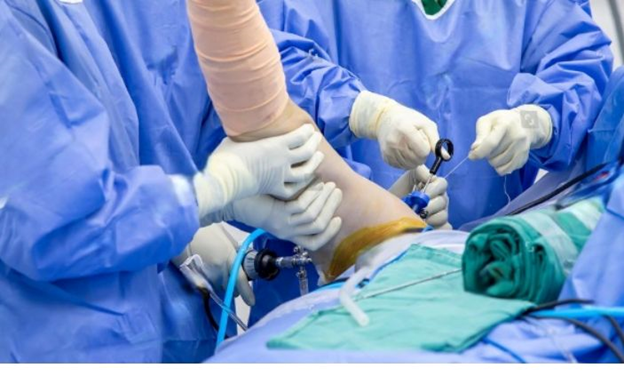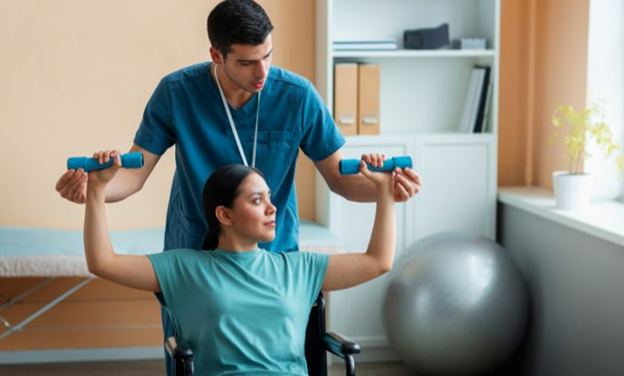Dr. rahul khanna
M.S. (ORTHO), FIASM, FIA
Specialist Joint Replacement, Arthroscopy & Sports Injury
Menu
Dr. rahul khanna
M.S. (ORTHO), FIASM, FIA
Specialist Joint Replacement, Arthroscopy & Sports Injury
Menu
Rehabilitation After Rotator Cuff Surgery: What to Expect?
Did you recently have rotator cuff surgery? If so, congratulations on taking the first step towards restoring strength and range of motion in your shoulder. The next step is rehabilitation, which is crucial to your recovery. In this guide, we will cover every detail of what to expect on your road to recovery after rotator cuff surgery. We have you covered every step of the way, from post-operative care to returning to your favorite activities.

Patience is the Key
After undergoing rotator cuff surgery, your shoulder will require special attention for some time. You might feel some discomfort and tenderness during the healing process of your body. It’s important to follow Dr. Rahul Khanna’s post-operative recommendations carefully. This includes keeping your shoulder immobilized and taking any painkillers as prescribed. It’s important to remember that healing takes time and patience. So, it’s crucial to treat yourself with kindness and patience throughout the process.

Physical Therapy
Once the initial pain and swelling have subsided, it’s time to begin physical therapy to initiate the rehabilitation process. Your physical therapist will work closely with you to create a personalized workout plan that will help you regain strength and range of motion in your shoulder. Expect a combination of mobility, strengthening, and stretching exercises tailored to your specific needs and abilities. Although the process may not always be easy, trust in the process and remember that each repetition will bring you one step closer to recovery.
Building Strength and Stability
During your rehabilitation, you will focus on strengthening and stabilizing your shoulder. To achieve this, your regimen may include exercises that target the muscles around the rotator cuff and functional motions that mimic everyday tasks. Although the progress may seem slow, remember that every repetition counts towards developing a stronger, more resilient shoulder.

Overcoming Challenges
Recovering from rotator cuff surgery can be a complex process, and it’s not uncommon to experience setbacks or plateaus in the healing journey. You may notice that you are not progressing as quickly as you had hoped, or that your pain or discomfort is increasing. However, it’s imperative to maintain a positive attitude and keep moving forward during these times. You can rely on your support system, whether it includes your loved ones or physical therapist, and remember that setbacks are only temporary roadblocks towards your recovery.
Returning to Activity
It’s understandable to feel excited about getting back to your regular activities after a shoulder injury.”It is important to exercise caution and pay attention to your body’s signals.” To avoid any further damage, it’s advisable to reintroduce stressful activities to your shoulder gradually. Begin with low-impact workouts and slowly build up to more intense exercises as your body tolerates. Remember, the goal is to establish a strong foundation for long-term shoulder health rather than rushing to return to full activity.
Recovery
It’s important to acknowledge and appreciate the small victories along the way as you recover. Take a moment to give yourself credit for your progress, whether it’s reaching a new milestone in your range of motion or completing a challenging exercise routine. Every step forward is a testament to your determination and strength, and you should feel proud of each accomplishment you achieve.
Embracing the Journey
Recovering from rotator cuff surgery can be a difficult task, but with determination, patience, and the assistance of a skilled medical team, you can overcome any obstacle. Get ready to begin a journey that will lead you to a more robust and resilient shoulder. Grab your sneakers, pull out your resistance bands, and let’s get started. You can do this! Take the first step towards regaining strength and mobility after rotator cuff surgery by contacting Dr. Rahul Khanna today.
Emergency?
24 Hour Ready
Call Us for Emergency
+91-9828501360
Book an Appointment
Seamless Fitness Care Access: Booking an Appointment with Your
Trusted Doctor